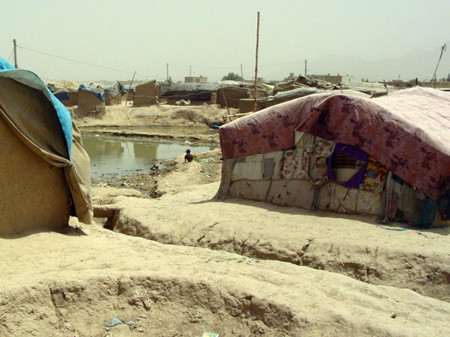By Nasrat Shoaib
KANDAHAR, Afghanistan — Hundreds of families have been displaced by fierce clashes in southern Afghanistan as NATO-led forces fight to eradicate the Taliban from the militants' heartland, officials said Wednesday.

Tens of thousands of people from Helmand, Zabul and Uruzgan provinces have been displaced from their villages as a result of the US/NATO bombardments and Taliban insurgency. Over 700 families are living in a IDPs camp in Charahi Qambar area of Kabul. The livings conditions of people in this camp are deplorable and they say neither government nor any NGO provide help to them so their children are starving. (Photo: RAWA)
People are fleeing insurgent-infested districts around Kandahar city as Afghan and US-led NATO forces step up military operations against the Taliban, said the director of Kandahar's refugee department, Mohammad Azim Nawabi.
"More than 900 families have arrived from Arghandab and Zhari districts to Kandahar city in the past month," Nawabi told AFP.
"People are still fleeing their villages and are in a very bad state when they arrive," he said, adding that many of the refugees were empty-handed.
Some refugees who had arrived from Arghandab described heavy fighting between the pro-government forces and the Taliban, and said they had been forced to leave at harvest time, jeopardising their livelihoods.
"I lost three of my family members, my son and two grandchildren, who were killed when a rocket hit our house," said 56-year-old Gulalai.
"We had to leave our homes, the Taliban and the Americans were all killing us," she said.
Haji Mohammad khan, 45, said: "We had to leave or be killed.
"In a week we should be starting the harvest but now with this fighting we are very worried. The grapes and pomegranates are the only source of income we have," he said.
More than 7,000 NATO and Afghan troops launched a major military offensive code-named Operation Dragon Strike around Kandahar city last week, said the commander of the foreign forces, US General David Petraeus.
Dragon Strike is the latest phase of Operation Hamkari -- launched around five months ago -- a last-ditch effort to eliminate the Taliban from Kandahar and the surrounding areas of Zhari, Panjwayi and Arghandab.
These areas had been "safe havens for the Taliban for over five years," Petraeus told AFP on Tuesday.
The Afghan Red Crescent Society predicted the flow of refugees could increase as the fighting drags on.
"We predict that if the military operations continue thousands more families will leave their areas and come to Kandahar city," said Ahmadullah Ahmadi, the society's international affairs adviser.
Nawabi said many of the families displaced so far had been able to find accommodation with relatives living in Kandahar.
Others were being helped by local and international charities, as well as the Kandahar city and provincial authorities, he said.
Kandahar city's population is estimated at 500,000, with another 500,000 in the surrounding districts.
Some charity groups put the average family size at five, but Afghan families are generally large and extended, encompassing three or four generations and many children.
The three areas -- Arghandab, northwest of Kandahar city, and Panjwayi and Zhari to the west -- have long been considered lethal Taliban haunts, mined with bombs that cause the overwhelming majority of deaths among foreign troops.
Clearing Kandahar of insurgents is seen as pivotal to the counter-insurgency strategy, which Petraeus described as a "comprehensive civil-military campaign".
It builds up to July 2011, which US President Barack Obama has laid down as the deadline for starting to draw down US troops -- though both the president and the commander have recently emphasised that it is not a pull-out date.



